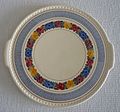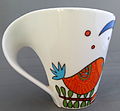 | |
| Company type | Public (Aktiengesellschaft) |
|---|---|
| ISIN | DE0007657231 |
| Industry | Ceramics |
| Founded | Lorraine, Holy Roman Empire (1748) |
| Founder | François Boch and Nicolas Villeroy |
| Headquarters | , Germany |
Key people | Gabriele Schupp (CEO), Georg Lörz, Dr. Markus Warncke, Dr. Peter Domma, Esther Jehle |
| Products | Tableware, bathroom ceramics |
| Revenue | €901,9 million (2023)[1] |
| 96,800,000 Euro (2022) | |
| 71,500,000 Euro (2022) | |
Number of employees | 6000 (2023) |
| Divisions | Dining & Lifestyle, Bathroom and Wellness |
| Website | www.villeroy-boch.com |
Villeroy & Boch (German: [ˌvɪlərɔɪ.ʔʊntˈbɔx], French pronunciation: [vilʁwa e bɔk]) is a German manufacturer of ceramics,[1] with the company headquarters located in Mettlach, Saarland.
History
The company began in the tiny Lorraine village of Audun le Tiche, where the iron master François Boch set up a pottery company with his three sons in 1748.[2] In 1766 Boch was licensed to build a ceramics kilnworks nearby at Septfontaines, Luxembourg, where it operated a porcelain factory. In 1785 Nicolas Villeroy became sole owner of the faience manufactory at Wallerfangen. In 1812 Jean-François Boch began construction of kilns at the nearby town of Mettlach, Saarland. In 1824 Boch commenced transfer printing on porcelain from engraved copper plates. On 14 April 1836, the Jean François Boch company merged with that of the competitor, Nicolas Villeroy, and became Villeroy & Boch, (V&B, also simply 'VB'). In 1869, Villeroy & Boch opened the first manufactory specializing in architectural tiles.
The company operates in two divisions: Dining & Lifestyle (formerly: Tableware), Bathroom and Wellness. The Tiles division became a separate company (V&B Fliesen GmbH) in 2006. In 2007 the Villeroy & Boch AG sold 51% of the V&B Fliesen GmbH to the (Eczacıbaşı Holding). Today there is only a 2.29% holding in the share capital of V&B Fliesen GmbH.
Among its innovations in Mettlach at the end of the nineteenth century was Phanolith, a kind of semi-transparent porcelain that combines the characteristics and benefits of jasperware and pâte-sur-pâte.[3] The creator of the Phanolith was the ceramics artist Jean-Baptiste Stahl, who headed the modelling section of Villeroy & Boch. Phanolith gained first wide public attention at the Paris Exposition Universelle (1900).
Villeroy & Boch has continued to base its broadest market in Germany. The company's Luxembourg factory was closed down in 2010.
In September 2023, it was announced Villeroy & Boch had acquired the Brussels-headquartered plumbing fixture company, Ideal Standard Group for €600 million.[4] In March 2024, Villeroy & Boch announced the acquisition had been completed.[5]
Stock market floatation and change of administration
Villeroy & Boch is now overseen by Group Chairman Frank Göring and is no longer run by family descendants. Members of the family continue to be employed by the company. Since 1990 the company has been listed on the German stock market, ticker symbol VIB3 although the voting capital is still in the hands of the family.
The Villeroy & Boch Group increased its consolidated revenue by 2% to €853.1 million in the 2018 financial year. The Bathroom and Wellness Division of the company increased its revenue by 4.7% to €584.3 million. The Tableware Division generated a revenue volume of €266.2 million, down 4.4% on the previous year.[6]
The company marked its 275th anniversary in 2023.[7]
In February 2024, Villeroy &Boch successfully completed the acquisition of all operating companies of the Ideal Standard Group.[8]
Gallery
- Examples of product range
-
Vase with the decor "Vieux Septfontaines"
-
Plate to commemorate the Golden Wedding of Eugen von Boch and his wife Oktavie in 1892
-
Tea cup, made in Wallerfangen
-
Jar of incised stoneware designed by Heinrich Schlitt
-
Vase of Phanolith-stoneware, design and realization Jean-Baptiste Stahl (1869-1932)
-
Phanolith Jardinière: design and realization Jean-Baptiste Stahl (1869-1932)
-
Phanolith wall plate: design and realization Jean-Baptiste Stahl (1869-1932)
-
Boxes for spices from incised stoneware
-
Lion figure made in 1910 by a worker for his son (traditionally, workers made such items for their children)
-
Soap dish, washbowl, and washstand pitcher design "Drina" (beginning of 20th century)
-
Vase design "Adria", c. 1934
-
Cake plate design "Goslar", mid 1930s
-
Milk jug design "Doris", c. 1930
-
Company logo on the bottom of a vase, c. 1934
-
Crystal glass, made in Wadgassen
-
Cup, made in the 2000s
Footnotes
- ^ Packagedfacts.com
- ^ Timeline and brief history notes supplied by Villeroy & Boch AG to FundingUniverse.
- ^ Post, Anton (1976). Ammelounx, Hans (ed.). Mettlacher Steinzeug 1885 - 1905. Saarwellingen: Hans Ammelounx.
- ^ "Villeroy & Boch Acquires Ideal Standard". www.insightdiy.co.uk. Retrieved 2023-09-19.
- ^ Dean, George (2024-03-06). "Villeroy & Boch completes Ideal Standard acquisition". kbbreview. Retrieved 2024-03-07.
- ^ Financial year 2018: Villeroy & Boch increases earnings by 7.6%. In: villeroyboch-group.com.
- ^ Villeroy & Boch Launches Its Anniversary Year With Extensive Bathroom Solutions For ISH 2023
- ^ "Villeroy & Boch completes acquisition of Ideal Standard and joins the ranks of Europe's largest manufacturers of bathroom products". EgyptToday. 2024-03-07. Retrieved 2024-03-28.
External links
- Company homepage Villeroy-Boch.com
- 275 Years Creating Homes – Anniversary Videos
- Château de Septfontaines ... origin of VB factories
- Old Abbey Discovery Centre & Museum of Ceramics by Villeroy & Boch
- Anna Boch.com, impressionist painter, famous Art Collector - Boch family 4th generation
- Eugene Boch.com, impressionist painter, friend of Vincent van Gogh - Boch family 4th generation
- A history of the Villeroy - Boch porcelain markings
- Mettlach Exhibition at the American Museum of Ceramic Art
- Documents and clippings about Villeroy & Boch in the 20th Century Press Archives of the ZBW























